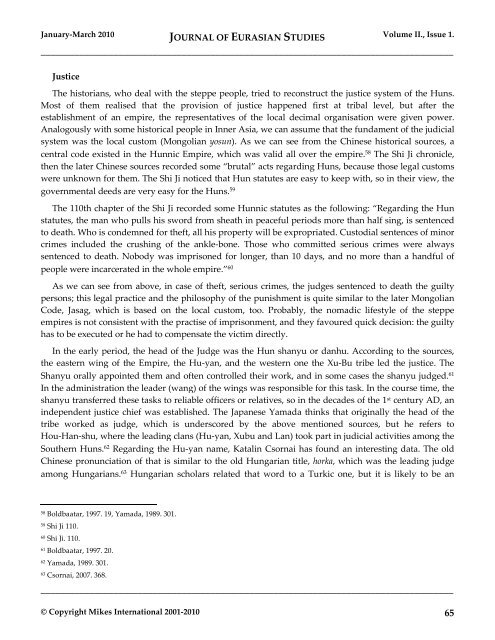EurasianStudies_0110..
EurasianStudies_0110..
EurasianStudies_0110..
You also want an ePaper? Increase the reach of your titles
YUMPU automatically turns print PDFs into web optimized ePapers that Google loves.
January-March 2010 JOURNAL OF EURASIAN STUDIES Volume II., Issue 1.<br />
_____________________________________________________________________________________<br />
Justice<br />
The historians, who deal with the steppe people, tried to reconstruct the justice system of the Huns.<br />
Most of them realised that the provision of justice happened first at tribal level, but after the<br />
establishment of an empire, the representatives of the local decimal organisation were given power.<br />
Analogously with some historical people in Inner Asia, we can assume that the fundament of the judicial<br />
system was the local custom (Mongolian yosun). As we can see from the Chinese historical sources, a<br />
central code existed in the Hunnic Empire, which was valid all over the empire. 58 The Shi Ji chronicle,<br />
then the later Chinese sources recorded some “brutal” acts regarding Huns, because those legal customs<br />
were unknown for them. The Shi Ji noticed that Hun statutes are easy to keep with, so in their view, the<br />
governmental deeds are very easy for the Huns. 59<br />
The 110th chapter of the Shi Ji recorded some Hunnic statutes as the following: “Regarding the Hun<br />
statutes, the man who pulls his sword from sheath in peaceful periods more than half sing, is sentenced<br />
to death. Who is condemned for theft, all his property will be expropriated. Custodial sentences of minor<br />
crimes included the crushing of the ankle-bone. Those who committed serious crimes were always<br />
sentenced to death. Nobody was imprisoned for longer, than 10 days, and no more than a handful of<br />
people were incarcerated in the whole empire.” 60<br />
As we can see from above, in case of theft, serious crimes, the judges sentenced to death the guilty<br />
persons; this legal practice and the philosophy of the punishment is quite similar to the later Mongolian<br />
Code, Jasag, which is based on the local custom, too. Probably, the nomadic lifestyle of the steppe<br />
empires is not consistent with the practise of imprisonment, and they favoured quick decision: the guilty<br />
has to be executed or he had to compensate the victim directly.<br />
In the early period, the head of the Judge was the Hun shanyu or danhu. According to the sources,<br />
the eastern wing of the Empire, the Hu-yan, and the western one the Xu-Bu tribe led the justice. The<br />
Shanyu orally appointed them and often controlled their work, and in some cases the shanyu judged. 61<br />
In the administration the leader (wang) of the wings was responsible for this task. In the course time, the<br />
shanyu transferred these tasks to reliable officers or relatives, so in the decades of the 1 st century AD, an<br />
independent justice chief was established. The Japanese Yamada thinks that originally the head of the<br />
tribe worked as judge, which is underscored by the above mentioned sources, but he refers to<br />
Hou-Han-shu, where the leading clans (Hu-yan, Xubu and Lan) took part in judicial activities among the<br />
Southern Huns. 62 Regarding the Hu-yan name, Katalin Csornai has found an interesting data. The old<br />
Chinese pronunciation of that is similar to the old Hungarian title, horka, which was the leading judge<br />
among Hungarians. 63 Hungarian scholars related that word to a Turkic one, but it is likely to be an<br />
58 Boldbaatar, 1997. 19, Yamada, 1989. 301.<br />
59 Shi Ji 110.<br />
60 Shi Ji. 110.<br />
61 Boldbaatar, 1997. 20.<br />
62 Yamada, 1989. 301.<br />
63 Csornai, 2007. 368.<br />
_____________________________________________________________________________________<br />
© Copyright Mikes International 2001-2010 65

















